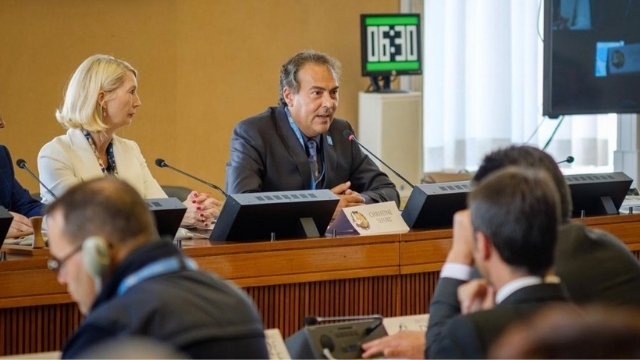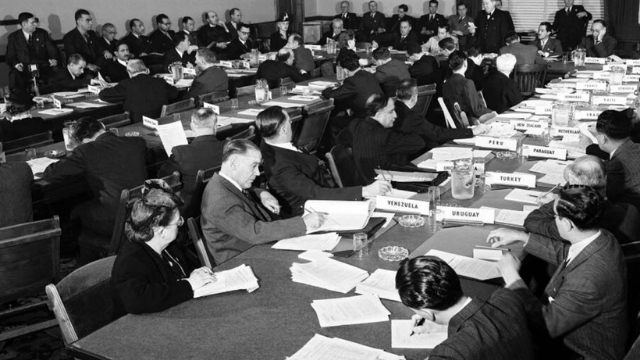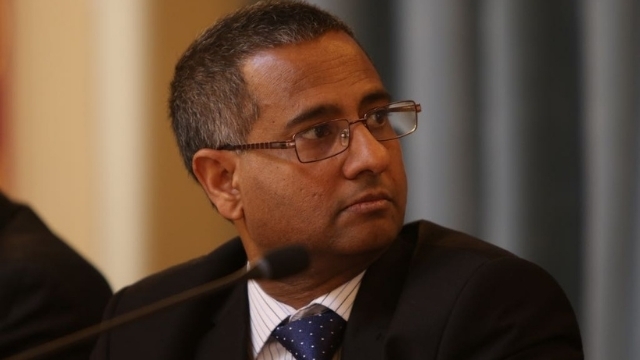11/02/2021THIERRY VALLE
How CAP-LC told the Tai Ji Men story and advocated for justice at the U.N. Human Rights Council.
by Thierry Valle*
*A paper presented at the webinar “The United Nations, FORB, and the Tai Ji Men Case,” organized by CESNUR and Human Rights Without Frontiers on October 24, 2021, United Nations Day.

United Nations Day has a special value for me, because since 2016 the ECOSOC status of our NGO has allowed us to collaborate with the different UN bodies as well as with the Special Rapporteur on Freedom of Religion and Belief.
During these years we have been able to appreciate the international importance of the UN and what can be achieved with the U.N. bodies in the defense of human rights.
What is United Nations Day? It is a symbol of hope for world unity. United Nations Day, October 24, marks the anniversary of the day the U.N. Charter came into force in 1945. The Charter of the United Nations was signed on 16 June 1945, and came into force on 24 October of the same year.
The Charter defines the fundamental purposes of the United Nations as follows:
“1. To maintain international peace and security, and to that end: to take effective collective measures for the prevention and removal of threats to the peace, and for the suppression of acts of aggression or other breaches of the peace, and to bring about by peaceful means, and in conformity with the principles of justice and international law, adjustment or settlement of international disputes or situations which might lead to a breach of the peace;
2.To develop friendly relations among nations based on respect for the principle of equal rights and self-determination of peoples, and to take other appropriate measures to strengthen universal peace;
3.To achieve international co-operation in solving international problems of an economic, social, cultural or humanitarian character, and in promoting and encouraging respect for human rights and for fundamental freedoms for all without distinction as to race, sex, language or religion; and
4.To be a centre for harmonizing the actions of nations in the attainment of these common ends.”

31 years later, in 1986, the UN Commission on Human Rights appointed, in accordance with resolution 1986/20, a “Special Rapporteur on Religious Intolerance” and in 2000, the Commission on Human Rights decided to change the title of the mandate to “Special Rapporteur on Freedom of Religion or Belief,” which was subsequently endorsed by ECOSOC decision 2000/261 and welcomed by General Assembly resolution 55/97.
The Special Rapporteur on Freedom of Religion or Belief is an independent expert appointed by the United Nations Human Rights Council. The mandate holder is invited to identify existing and emerging obstacles to the enjoyment of the right to freedom of religion or belief, and to present recommendations on how to overcome these obstacles.
During his mandate, the Special Rapporteur works closely with civil society to identify groups that are victims of discrimination and establishes, together with civil society, the recommendations to be implemented by States to put an end to such discrimination.

Over the past four years at the U.N., with the help of the organizations that are present at this conference today, we have repeatedly denounced discriminations against minorities around the world.
We have brought to the attention of the U.N. the discrimination of religious minorities in China such as those suffered by the Uyghurs, the members of Falun Gong, and more particularly the dramatic case of the members of The Church of the Almighty God (CAG).
Session after session of the Human Rights Council, we organized conferences, made written and oral statements, and held meetings with State delegations, during which the victims were able to make their voices heard.
These repeated efforts to warn of serious discrimination and persecution have borne fruit, since today there is not a single session of the Human Rights Council where China is not singled out by the delegations of Member States and many NGOs.
Recently, the Special Rapporteur on Freedom of Religion joined with other special rapporteurs to issue a statement denouncing China’s policy towards religious minorities.
In this same period, we raised our voice to denounce the discrimination suffered by many other minorities who without us (and I am talking again about the organizations that are here today) would never have been heard in this United Nations forum.
In June 2021, we brought to the attention of the U.N. Human Rights Council the case of the Tai Ji Men and the injustice they suffer in Taiwan.
At this Human Rights Council, we denounced how the tax weapon was used to harm Tai Ji Men. In our statement, we highlighted and denounced the unscrupulous means used by the Taiwanese government in its attempt to destroy the Tai Ji Men movement.
The use of tax weapon against spiritual minorities is unfortunately common practice in many countries, including France, which finally, after a struggle to denounce this unjust practice at the Human Rights Council, was condemned by the European Court of Human Rights.
In September, at the 48th Human Rights Council session, we renewed our appeal for Tai Ji Men. This time, we highlighted the confiscation of the Tai Ji Men’s property intended to serve as a self-cultivation center by the Taiwanese government.
This is another form of discrimination, just as serious, because a spiritual community cannot exist without a place of worship.

Today the situation of the Tai Ji Men can no longer be ignored in the world, and the Taiwanese government must allow the Tai Ji Men to enjoy their property, their places of worship, and to make their contribution to world peace without worry.
The U.N. mechanisms allow civil society to participate in the improvement of our society, and it is important to continue to speak out against the unfair treatment of Tai Ji Men by the Taiwanese government.
In 2009, Taiwan ratified the International Covenant on Civil and Political Rights (ICCPR) and the International Covenant on Economic, Social and Cultural Rights (ICESCR). The International Covenant on Civil and Political Rights guarantees fundamental rights for every citizen as well as freedom of religion and belief.
The signing of the international covenants is of paramount importance, but there is still a step to be taken to implement and respect the commitments made when the covenant was signed.
The model proposed by the United Nations is a balance between these institutions, the member states and civil society. It is these three components that ensure that the fundamental purposes established in 1945 by the Charter remain at the heart of the United Nations.
Taiwan, like all other States, must find this balance with civil society and grow with it, not against it.
It is in fact the struggle of the Tai Ji Men that we support so that justice is done to them, so that their contribution to a better, peaceful and harmonious Taiwanese society is recognized.
Source: Bitter Winter
